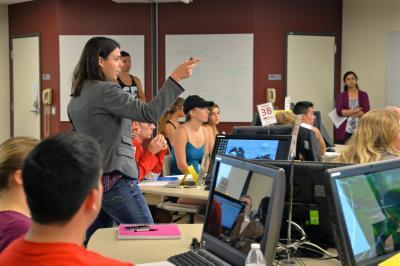In France, the concept of science remains much more strongly associated with masculinity than with femininity and it may lead to scientific evaluation committees putting women at a disadvantage during promotion rounds involving men and women researchers, say social science scholars.
America is not without bias, of course. Republicans, racial minorities, and handicapped people dream of a time when 35 percent of academia includes them, and in France as in the U.S. university insiders have the ready explanation of differences in levels of motivation, self-selection, etc. but is discrimination also part of the story?

To find out, scientists in social and cognitive psychology studied 40 evaluation committees tasked with evaluating applications for research director positions at the CNRS over a period of two years. In total, 414 people participated to the study. The committees considered in this study have since come to the end of their commission and this is the first time that a research institution has carried out such a scientific study of its practices in the course of an annual nationwide competition covering the entire scientific spectrum.
This study shows that, from particle physics to the social sciences, most scientists, whether male or female, associate "science" and "masculine" in their semantic memory (the memory of concepts and words). This stereotype is implicit, which is to say that most often it is not detectable at the level of discourse. And it is equivalent to that observed among the general population.
Yet does this implicit stereotype have consequences on the decisions made by evaluation committees? Yes, when committees deny or minimize the existence of bias against women.(3) Here, this is the case for around half of the committees. In these committees, the stronger the implicit stereotypes, the less often women are promoted. In contrast, when committees acknowledge the possibility of bias, implicit stereotypes, however strong they may be, have no influence.
Even if disparities between men and women in science have multiple causes and start at school (as the same authors have shown in other publications), this study indicates for the first time the existence of implicit gender stereotypes among male and female researchers across all disciplines - stereotypes that can harm the careers of women scientists.
Since 2019, at the instigation of the CNRS Mission for the place of women, members of evaluation committees have been invited to participate in training sessions on gender stereotypes and each committee has appointed a reference person in charge of gender equality issues. However, the authors of the study emphasize that, in order to be fully effective, this process must be accompanied by other measures aiming, on the one hand, to enlighten committee members on the exact conditions in which implicit stereotypes influence their decisions, and, on the other, to explain strategies likely to control this influence.
France is not alone in lagging behind the United States in this area. Holland also has a great deal of bias, with Denmark, Belgium and Sweden also showing rather poorly.






Comments